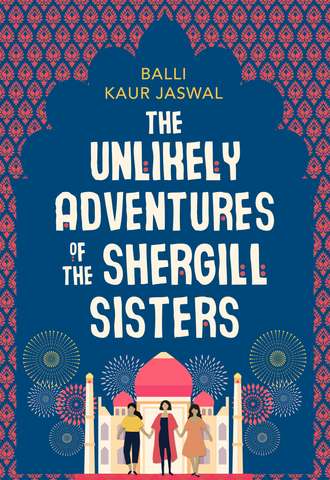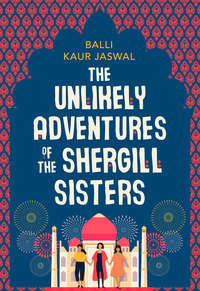
Полная версия
The Unlikely Adventures of the Shergill Sisters
‘Hello,’ Shirina said.
‘Hey, it’s me. Want to do some shopping at the market?’
‘Okay. Where’s Rajni?’
‘Didn’t have luck calling her. I’ll knock on her door,’ Jezmeen said.
They hung up. Jezmeen did a quick check in the mirror and ran her fingers through her hair. Brushing it wouldn’t help much against the gritty air once they got outside.
Rajni’s room was at the end of the hall on Jezmeen’s floor. She knocked and waited, then knocked again. Eventually, there was a voice at the door. ‘Yes?’
‘Raj, it’s Jezmeen. Open up.’
The door opened a crack through which Jezmeen could see one reddish eye. ‘I was napping,’ Rajni croaked.
‘Shirina and I are going shopping. You coming?’
‘Uh … no thanks. I’m going to stay in.’
‘Come on, Rajni. You have to see some of India while you’re here. You don’t have to just do what Mum stated in her letter.’ Jezmeen thought about it. ‘In fact, this is a great way to honour her memory. Mum loved a bargain and never understood why I bought clothes from High Street stores when they sold every type of knock-off at the flea markets she loved going to.’
It was a joke, but Rajni’s reaction didn’t change. ‘I think I’m coming down with something,’ she said.
Jezmeen sighed. She tried to sympathize – after all, during her paranoia stage, she had driven herself to A&E over a chest pain that turned out to be nothing but a reflux reaction to some salsa. But Rajni’s aversion to India was so … wimpy. Ever since their pilgrimage plans were confirmed, Rajni had made a regular habit of forwarding cautionary articles. ‘Make sure you bring hand sanitizer from home – not sure if we can trust the local brands!’ read one subject line. ‘HAVE YOU SEEN THIS?’ read another. The email contained links to a story about a bridge that had collapsed in a rural northern town. Rajni’s India was a land of disasters.
‘We’ll go ahead then,’ Jezmeen said. ‘Hope you get better soon.’ Rajni sniffed loudly, mumbled her thanks and shut the door. Jezmeen stood there for a moment, contemplating her choices. Leave it or not? She knocked again. Rajni opened the door widely this time. Her eyes were puffy. It was clear that she’d been crying.
‘Oh, Raj. I’m sorry,’ Jezmeen stuttered. ‘I didn’t think …’
Rajni shut the door in her face.
Jezmeen stood in the hallway, stunned. She had never seen Rajni crying, not even during Mum’s funeral. Her eyes had been bloodshot but it was clear that she had taken the time to cry in private before the ceremony. Did Rajni also blink sometimes and see Mum leaning over the edge of her bed, reaching for her jewellery case? Jezmeen woke abruptly some nights because that moment played back in her dreams, the details slightly different each time. Her subconscious exchanged the pale-pink colour of the hospital-room curtains for a cheery yellow and moved the dresser a few inches away, so Mum struggled to reach it and gave up. But even when Jezmeen was aware she was dreaming, she could never wake up before Mum died. That conclusion repeated itself in an infinite loop.
Jezmeen knocked on the door. ‘Raj?’ You can talk to me, she was about to say, but could she? She didn’t know how they’d begin to talk about Mum’s death and she suspected she knew how it would end – yet another fight.
Bargaining required no shortage of confidence. You had to be assured that you were in the right from the start, and willing to walk away from the item because pride was more important than purchase. This was why Shirina tried not to get too attached to anything she saw at the market – she didn’t want to get into an argument like Jezmeen was having right now, which was verging on violence.
‘You’re expecting me to pay that much for these cheap chappal? Look at the workmanship. Look at these threads poking out.’ Jezmeen waved a shoe in the shopkeeper’s face. Rhinestones marched a path along overlapping plastic straps towards a shimmering plastic gem set in the centre. ‘Cut the price in half and we’ll talk.’
‘In half?’ the shopkeeper screeched. Shirina realized immediately that she’d underestimated him. He rolled up his sleeves as if listing the shoes’ attributes was just as physically demanding as making them. Jezmeen did not look intimidated. As they continued to argue, the centrepiece came loose from the sandal and plopped to the dusty ground between them.
‘We’re done,’ Jezmeen declared triumphantly, throwing her hands up and washing them clean of the sandals. She took Shirina’s hand and led her to another stall. It was like being children again, except Jezmeen had always left Shirina trailing far behind. She held on tight. This was not a place where she wanted to get lost. The market bustled with chaos and it was full of men wandering in packs, their eyes sometimes connecting with Shirina’s, at which point she hastily looked away. A stray dog with a ladder of ribs showing through his dingy fur weaved between two parked motorbikes at the side of the road. The row of shops seemed to stretch for miles, and where it ended, the main road was choked in peak-hour madness. She and Jezmeen had walked here, their feet traversing pavements that whittled into slivers and then vanished altogether, only to appear once more a few moments later.
‘Honestly, they were bloody ugly shoes, weren’t they?’ Jezmeen muttered to Shirina.
‘Why waste all that effort bargaining then?’ Shirina asked.
‘Sharpening my skills,’ Jezmeen said. ‘Look around. There’s so much to buy.’
It was overwhelming – the columns of sari fabric and their dizzying brocade patterns, entire wall displays of glittering bangles in every possible shade. In a magazine, Shirina had once seen a sari made up entirely of tiny squares of every colour. Every single shade and variation in existence. It was beautiful and novel, but also functional, the designer’s write-up explained. Women could wear the sari on their next trip to the tailor and pick out the exact colour they wanted from this wearable palette.
‘I do need a pair of cheap sandals though,’ Jezmeen said. ‘I don’t mind if they’re a little gaudy, although those were just hideous. I need a decoy for the temple.’
Shirina smiled. She remembered shoe decoys from when they were young. It was always wise to wear your least expensive shoes to the gurdwara lest they get ‘lost’ or swiped from the cubbies outside. But they had to be presentable as well – tattered old Converse runners did not complete the Punjabi ensemble.
‘Italian leather,’ Shirina said, in a high-pitched imitation of their childhood friend, Sharanjeet Kaur.
‘Custom-fitted with a one-of-a-kind in-sole,’ Jezmeen replied in a matching pitch.
‘Designed by our personal cobbler.’
Jezmeen and Shirina both laughed. This was how they used to be, kicking each other under the covers and listening out for Rajni’s footsteps. It was when Jezmeen started getting them into too much trouble that they started drifting apart. The first time Shirina told Sehaj she had sisters, she expected him to ask her what they were like, but he didn’t really want to know about them. He was an only child, and she envied his untethered existence. For Shirina, at least until she stopped following Jezmeen around, having a sister meant being complicit in schemes and being seen as part of a pair rather than an individual.
‘I wonder what Sharanjeet is up to these days,’ Jezmeen said. ‘What a bloody snob. Marries a rich guy and all of a sudden she’s name-dropping her designer at your wedding and talking about her holiday house in the South of France. And that fuss she made after the ceremony when she couldn’t find their shoes right away, like we had stolen them. Wasn’t that long ago that she was a restaurant hostess.’
‘I don’t think she came to the wedding for me,’ Shirina said. ‘She wanted to rub shoulders with Sehaj’s family.’ Shirina had been surprised at Sharanjeet’s appearance at all of her wedding events. A childhood friend who had disappeared once she got married, she was eager to reconnect with Shirina when she discovered whose family she was marrying into.
‘Have you stayed in touch since then?’ Jezmeen asked.
Shirina shook her head. ‘I know she named her daughter Chanel,’ she said.
Jezmeen rolled her eyes. ‘I saw pictures of Chanel on her Instagram account. I think Sharanjeet blocked me at some point, though. I haven’t seen anything from her in ages.’
‘I’m sure it’s all really superficial anyway.’ Shirina said this with a shrug, as if she had lost track of Sharanjeet as well. She didn’t want Jezmeen knowing that although she appeared inactive on social media, she still logged in to look up people like Sharanjeet, who publicized every inch of her privileged life. There were snapshots of designer bags and posed ‘deep-thinking’ pictures on the golden sands of Mediterranean beaches. The chorus of comments from Sharanjeet’s friends and followers was openly envious and admiring. With nobody questioning what Sharanjeet’s life was really like, Shirina felt petty doing so. Surely there were days when she fought with her husband or spent the afternoon simply waiting for the plumber to show up to fix the leaky tap was that driving her mad – but her pictures presented a life so unspoiled that Shirina didn’t mind only believing in this version of it.
‘You know who else recently had a baby?’ Jezmeen said as they followed the current of the crowd. ‘Auntie Roopi’s daughter. She added me on Facebook recently.’
‘Our old neighbour, Auntie Roopi?’
‘Yup, from across the street. We stayed with her one summer, but you’re probably too little to remember that. She had a cat that you desperately wanted to bring back to our house.’
Shirina vaguely recalled this cat, and the scent of channa masala bubbling on a stove in a kitchen that was bigger than theirs. She remembered going to Auntie Roopi’s house sometimes but didn’t remember living there. ‘Why did we stay with her?’
‘Mum and Rajni went to India together. It was shortly after Dad died. I think they were gone for about a month.’
An image was beginning to surface: tickling competitions with Jezmeen and the cat: the cat flicking its tail at their ankles while they struggled to keep straight faces. Shirina was about four or five, and they were over at Auntie Roopi’s, having lunch. Auntie Roopi let them watch cartoons while she bustled around the house with a vacuum cleaner. At one point, she crossed the living room, blocking the television for a moment while she peered through the curtains. ‘Your Mum’s still away,’ she said. ‘You can stay for dinner.’ But Mum was home all day, and the curtains of their house were always drawn, so Auntie Roopi was just saying that for their benefit. Shirina and Jezmeen came home eventually to find Mum lying in bed, in the same place she’d been when they left. Rajni had told them off afterwards for upsetting Mum, and said to Jezmeen, ‘I expect better behaviour from you from now on.’
It seemed that Jezmeen was remembering the same thing, because she said, ‘Rajni was so strict with us when we were little.’
With you, Shirina thought. She learned it was better to avoid trouble after that incident, even if it meant also avoiding Jezmeen. ‘I suppose she was just helping Mum,’ Shirina said. ‘She probably felt she needed to help raise us since Dad wasn’t around.’
‘Oh sure, lots of things had to change after Dad died,’ Jezmeen said. ‘But she used to be more fun. You wouldn’t know it now, but Rajni was cool. She had this stash of sparkly eye shadows and bold lipsticks – the sort of thing Mum probably wouldn’t let her wear, because I remember she always kept it hidden and didn’t tell me where it was. She used to put it on me sometimes, and we’d dance around in her room. I was probably four years old then.’
It didn’t sound like the Rajni that Shirina knew, and she was surprised to hear Jezmeen remember her this way. ‘What changed?’
Jezmeen shrugged. ‘I don’t know. Dad’s death, maybe? She and Mum fought a lot after that. There was also a visit from Dad’s older brother before that, and that sparked a couple of arguments. They went to India the summer after Dad died. I remember she was really quiet when she came back from India with Mum and then soon after that, she was taking charge and being Sergeant Rajni – all about following the rules. And I have been resisting her ever since.’
Jezmeen said this with some pride, but any mention of Shirina’s childhood, especially the teenage years, called to mind the sound of her sisters shouting. The arguments were so hostile and belligerent on both sides that it always felt as if the walls of their house were on the verge of collapsing. She had never fought with Rajni or Mum like that. She certainly refrained from taking every piece of bait her mother-in-law dangled before her; it was easier to say yes than to fight every battle. Life was so much more complicated if you always had to win. She recalled an Instagram post of Sharanjeet’s from Christmas last year – mulled wine, a stack of presents wrapped with gold ribbons and the soft glow of a fire in the background. Baby, it’s cold outside, but my love knows just how to keep me warm, the caption read, followed by a litany of hashtags: #winter #fireplace #mulledwine #xmascountdown #love #family #pressies #tiffanys #besthusbandever #besthubbyever #spoiled #butimworthit. Shirina had read the caption over and over again. Painstaking selection of filters enhanced the picture so she could almost hear the firewood crackling gently. Shirina had been so absorbed in the world of Sharanjeet’s life that she only vaguely registered Mother talking behind her. Look at me when I talk to you, Mother snapped, plucking the phone from her hand. It gave Shirina a small fright, because she hadn’t realized the conversation wasn’t over. Later, she told Sehaj about it, who frowned and said, ‘I’ll talk to her.’
‘Ah, there it is. Madhuri Fashions,’ Jezmeen said, nodding at a stall with magazine cut-outs pasted on its walls above a sewing machine. An elderly man stooped over the machine, tiny gold-framed spectacles perched on the tip of his nose. For his sake, Shirina hoped that the bargaining process would be reasonable. ‘I’ll be in there,’ she said, pointing to the bookshop next door.
Books were crammed into every space, making them impossible to remove. When a title caught Shirina’s eye, she extracted it with her fingernails. ‘Yes,’ the bookshop owner said. ‘Very good story.’
‘You’ve read this?’ she asked. It seemed unlikely. The title – Mister Right Now – was in raised pink lettering and didn’t exactly shout this man as its demographic.
‘I’ve read them all,’ he said.
Well, that was impossible. There were too many books here for one person to have read in a lifetime. There were books in German and some in Scandinavian languages too, left here by tourists probably. His earnestness was admirable though. Probably sensing that Shirina didn’t believe him, he started pointing to the spines of books and giving her a brief synopsis of each.
‘Very bad man starts a corrupt business. Mafia bosses turn against him. He becomes very good man.
‘This one: a family moves into a new house after the father loses his job and they find out it is haunted.
‘A scientist starts a research station in some faraway country and spends thirty years there trying to find out what happened to his lost love.’
Shirina was amazed until she realized she had no way of verifying his claim. She nodded. ‘Okay, okay,’ she said, signalling with a wave that she had given up doubting him.
‘Buy a book and I will also give you a numerology reading,’ the man said, pointing at a little sign next to his cash box. ‘When is your birthday?’
‘May 10th, 1990,’ Shirina said.
He repeated the date and tapped rapidly on a calculator. ‘Your life path number is seven,’ he said. ‘Seven is a good number.’
‘Oh,’ Shirina said. She waited for more, but he returned to the shelves and began smoothing out the stacks by jamming the spines of books even further in. ‘What does seven mean?’ she asked. She had never had a numerology reading before – they were like horoscopes, worded to suit every person in some way. But horoscopes were intriguing sometimes. The recognition of herself was thrilling.
‘For that, you must pay,’ the man said.
Shirina almost laughed. She reached into her purse and wondered if the man knew how lucky she was that Jezmeen wasn’t here. Once he took the money from her, he ducked back behind the counter again and opened up a slim silver laptop. Shirina’s eyes followed its path of cables across the floor where they tangled and disappeared behind a cotton sheet nailed to a ceiling beam, serving as a curtain. The man waited, staring intently at his screen and then went to that back room. He appeared moments later with a printout.
‘This is all the information about number seven,’ he said.
Great. So she had just paid for a Google search. His face did not betray any acknowledgement that he had ripped her off. The ink was still damp on the paper; he took care to hand it to her on two flat hands, like a platter. Some words jumped out immediately at Shirina: ‘sympathy’, ‘responsibility’. Then this sentence:
The number seven represents a person who will do anything to keep her family together. She keeps the peace and maintains harmony in situations of conflict.
This was why Shirina only read horoscopes once in a while in Cosmo or in the newspaper. If she subscribed regularly, their relevance became diluted. She saved them up and enjoyed the surprise of reading a description that matched her situation profoundly. The day before leaving Melbourne for Delhi, she had searched for her horoscope online – just one, she told herself, because it defeated the purpose to select the best of ten predictions.
You are at a crossroads but the power to make a decision is completely within your control. Consider the needs of your loved ones during this delicate time.
Words written so clearly that she could almost hear them.
Next door, Jezmeen was patiently standing with her arms stretched out while a silver-haired woman looped a measuring tape around her chest. ‘I’m getting a blouse made,’ she said when she saw Shirina.
‘They’ll be able to sew it that quickly?’ Shirina asked. They were only in Delhi for another day.
‘Yeah, I think that’s why Mum recommended this shop. She did like it when things could be done quickly. Hang on—’ She looked down. The woman was pressing the measuring tape to her collarbone, far above the neckline of the blouse in the picture. ‘I want it to look like that blouse,’ Jezmeen said, nodding at a picture on the wall. She sliced her hand across her chest to show exactly where the neckline should be. ‘And sleeveless, please. It’s too hot for anything else.’
The woman looked at her husband, who rose from a stool behind the counter. ‘Madam, we can do this neckline only.’
‘What do you mean?’
‘This is a decent neckline. You walk around in Delhi with anything lower, there will be trouble. You must also have sleeves.’
‘Yes, trouble,’ Jezmeen muttered to Shirina. ‘Mass erections. A city-wide catastrophe.’
Shirina didn’t think a decent neckline was such a bad idea though. Her own blouse buttoned up at the neck and hung loosely around her waist. She had given away a lot of her sleeveless clothes to the Salvation Army a few months after moving to Australia, when it became clear that Mother didn’t approve of them. The four-seasons-in-a-day weather in Melbourne was so unpredictable anyway that Shirina didn’t have much use for anything that revealed her arms.
The measuring tape dangled from the crook of the woman’s elbow. ‘You want the order, or you want to cancel?’ she asked impatiently.
‘If I told you I wasn’t going to wear this blouse in India, would you make it the way I want it? I’m going back to London.’
The woman shook her head with certainty while her husband retreated behind a small cabinet. He produced a clear plastic folder. It bulged with pieces of paper sticking out. Shirina patted the numerology paper in her pocket, relieved it was still there. It seemed that in the disarray of this market, there was no designated place for anything, and her printout fortune could very easily disappear into a stack of paper.
‘You see what I have done,’ the man said. His cheeks shone with pride as he presented the open folder to Jezmeen. Shirina wasn’t sure which he was prouder of – his work, or his cataloguing of it. On each left-hand page, there was a glossy picture cut out from a magazine, usually a Western woman. On each right-hand page, there was his corresponding version – a tailored copy of the dress or skirt or blouse, with adjustments made for ‘decency’. Necklines were raised from chest to throat. Skirt hems dropped below the knees. Waists were so generous that the dresses hung loose and forlorn like potato sacks.
‘Decent,’ the wife said, nodding her approval at the folder. ‘If we made these clothes exactly to the specifications on the models, people would complain.’
‘I won’t complain,’ Jezmeen said. ‘Honestly, I’d just like an exact copy of that blouse over there.’
The woman screwed her eyes at Jezmeen. ‘You’ll wear it with what? Jeans?’
‘Yes.’
‘Then the hemline needs to be longer. Needs to cover this area.’ She made a vague gesture at her lower half.
‘You know, I could go to any other stall around here. I chose you because you came highly recommended by my …’ Jezmeen’s voice trailed off. ‘By Mum,’ she said to Shirina. ‘She knew these people would try to make me a blouse with the fitting of a bed sheet.’
‘You think so?’ Shirina asked.
‘I’m sure of it,’ Jezmeen said. ‘It’s her final attempt.’ She had a rueful smile on her face but Shirina caught something else too – a brief shadow over her expression. ‘This is probably one of the ways she wanted me to “start taking more responsibility”.’ Jezmeen put air quotes around Mum’s words. Shirina didn’t know exactly what Mum had said, but it clearly bothered Jezmeen.
‘Can’t you just make it exactly the same?’ Jezmeen pleaded. ‘We won’t tell anybody, if that’s what you’re worried about.’
They shook their heads.
‘You can return my deposit then,’ Jezmeen said.
The man and his wife exchanged a quick look. ‘Deposit is non-refundable,’ they both said in unison.
Shirina stepped out of the stall just as the arguing began. She surveyed the shops once again, disappointed that she’d return to the hotel empty-handed. There was just nothing she wanted enough to fight for. Behind her, Jezmeen was accusing the shopkeepers of swindling her. Shirina wandered back to the first shop with the hideous shoes. She supposed she needed a pair of decoy sandals herself. ‘Two hundred rupees?’ she asked, quoting Jezmeen’s final price from their earlier bargaining.
Конец ознакомительного фрагмента.
Текст предоставлен ООО «ЛитРес».
Прочитайте эту книгу целиком, купив полную легальную версию на ЛитРес.
Безопасно оплатить книгу можно банковской картой Visa, MasterCard, Maestro, со счета мобильного телефона, с платежного терминала, в салоне МТС или Связной, через PayPal, WebMoney, Яндекс.Деньги, QIWI Кошелек, бонусными картами или другим удобным Вам способом.






